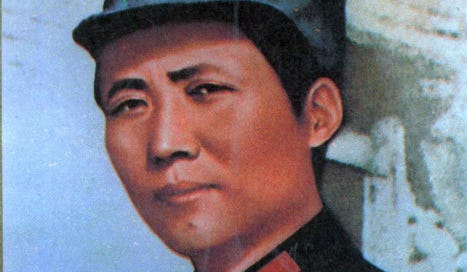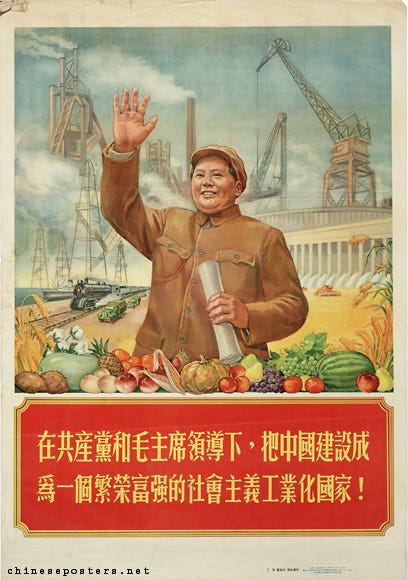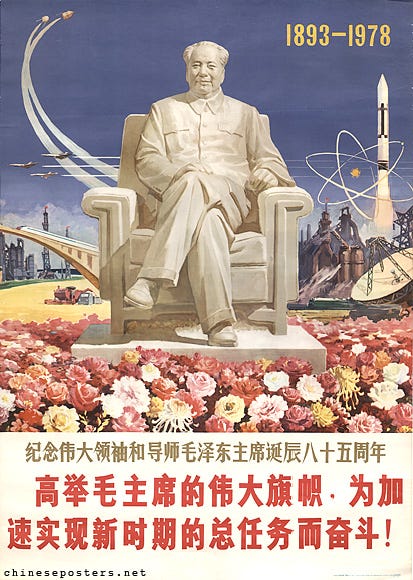Happy 129th Birthday to Chairman Mao Zedong!
Mao was born on December 26th, 1893, in Shaoshan, China. Just as Stalin was an important Marxist who greatly led the people of the USSR, Mao led the millions of Chinese workers and peasants to independence from feudalism, bureaucratic-comprador capitalism, and imperialism. Just like Stalin, Mao had many achievements in his leadership. Mao led the people’s war against Japan’s brutal imperialist invasion, and the people pushed out the corrupt Kuomintang reactionaries. After expropriating the comprador- and bureaucratic-capitalist property and enacting land reform, China’s economy grew rapidly, and healthcare, education, employment, housing, and more were guaranteed while incomes were given according to work and income taxes were abolished. When the socialist transition went forward by 1956, nationalizing all bourgeois property and collectivizing peasants’ property, the productive forces expanded even more. The population doubled, as did life expectancy, thanks to the improvements in quality of life. China’s military became a force to be reckoned with globally, and the armed and organized ordinary people secured proletarian power domestically.
The masses, following Mao and his application of Marxism-Leninism, were able to improve their lives and truly hold political power. China under Mao was also able to correct some errors that Stalin’s USSR made. Most importantly, it was China that got closest to establishing communism, for during the Cultural Revolution, the relations of production and the superstructure advanced extremely rapidly, and the productive forces expanded to the benefit of the masses! Just like Stalin’s USSR, we see Mao’s China as a great example of socialism, and we seek to emulate it!
Before the revolution, life expectancy in China was around 35 years. China was ravaged by famine, war, stagnation, feudalism and colonial brutality. By the time Mao died in 1976, life expectancy had almost doubled, to 67 years. Now it’s 76. The pre-revolution literacy rate in China was around 20%. By the time Mao died, it was around 93%. China’s population had remained stagnant between 400 and 500 million for a hundred years or so. By the time Mao died, it had reached 900 million – clearly, something changed for the better; clearly circumstances were generally favourable for human life! Women, ground down by millennia of feudal backwardness, were able to make unprecedented gains towards attaining social equality. A thriving culture of literature, music, theatre and art grew up and suddenly became accessible to the masses of the people – even to the endlessly ground-down Chinese peasantry, who had never had access to such things. Chinese land was irrigated. Universal healthcare was established. China – after a century of foreign domination – maintained its sovereignty, developed industry, developed the means to defend itself militarily, helped other nations – less than a year after the proclamation of the People’s Republic of China, China sent an enormous volunteer army, led by one of the great revolutionary heroes, Peng Dehuai, to fight with the Koreans against the US. 180,000 Chinese soldiers gave their lives in that war.
So the Mao era was not the nightmare it is sometimes painted as. Mao was not a monster; he was one of the truly great revolutionary leaders of the 20 th century, and it’s correct that we recognise him as such. To talk of Mao’s mistakes is fine; that’s important too. He was after all a human being, and by definition made mistakes. Being the leading figure in a revolution that covers a quarter of the world’s population, his mistakes had a little bit more impact than other people’s mistakes! I, for one, make mistakes all the time, but I have very little in the way of power or influence and therefore nobody really notices! But when it comes to Mao, the mistakes were those of a great revolutionary, an exceptional leader who, more than any other single person, is responsible for the liberation of China. [Source]
Despite a brutal U.S. blockade on food, finance and technology, and without incurring debt, Mao grew China’s economy by an average of 7.3 percent annually, compared to America’s postwar boom years’ 3.7 percent. When he died, China was manufacturing jet planes, heavy tractors, ocean-going ships, nuclear weapons and long-range ballistic missiles. As economist Y. Y. Kueh observed: “This sharp rise in industry’s share of China’s national income is a rare historical phenomenon. For example, during the first four or five decades of their drive to modern industrialization, the industrial share rose by only 11 percent in Britain (1801-41) and 22 percent in Japan”. His documented accomplishments are, as Professor Fairbanks says, almost unbelievable. He:
doubled China’s population from 542 million to 956 million
doubled life expectancy
doubled caloric intake
quintupled GDP
quadrupled literacy
increased grain production three hundred percent
increased gross industrial output forty-fold
increased heavy industry ninety-fold.
increased rail lineage 266 percent
increased passenger train traffic from 102,970,000 passengers to 814,910,000.
increased rail freight tonnage two thousand percent
increased the road network one thousand percent.
increased steel production from zero to thirty-five MMT/year
Increased industry’s contribution to China’s net material product from twenty-three percent to fifty-four percent.
But, from Mao’s point of view, that was a sideshow. By the time he retired, he had reunited, reimagined, reformed and revitalized the largest, oldest civilization on earth, modernized it after a century of failed modernizations and ended thousands of years of famines. A military genius (Field Marshal Bernard Montgomery compared his greatest battles favorably to Alexander’s and Napoleon’s); strategist and political innovator; master geopolitician; and peasant and Confucian gentleman. [Source]
Of course, like with any socialist project, Mao’s China had flaws. For example, the Great Leap Forward had extremely bad famine; for another example, the Cultural Revolution had excesses in executions and other killings. Still, we must understand them as they really were, and we cannot believe the spoon-fed distortions of Chinese history that fascists and imperialists have forced onto us since childhood. Worst of these lies is the claim that Mao killed the most people of all leaders ever! We already wrote on how the absurd “death toll of communism” is false, but in short, actual evidence and honest research refutes these assumptions!
During the Great Leap Forward, there was a huge, parallel development in agriculture: the People’s Communes. The Chinese people developed a collective form that was basically at the county level. That meant that the peasants could pool resources on a much larger scale—develop canals and machine shops and side industries. All of this was impossible at the small-collective or family farm level; only during the Great Leap Forward did this begin to happen on a massive scale. Afterwards, they had a basis for commune machine shops, to send kids for technical training, etc.
However, did the furnaces lead to bad crops? No, as we know, in feudal times agriculture went by human-pulled and animal-pulled plows. And these furnaces did develop usable plows. There was no mechanized agriculture yet (except in a few advanced areas)—the whole point was/is to develop agriculture and industry. The furnaces did not “destroy” mechanized agriculture; the process laid the basis for Chinese peasants to be able to deal with machinery and technical things. They developed collective forms (at the People’s Commune levels) to develop the furnaces—and those forms were later used to set up machinery repair places etc.
The socialist revolution made it possible to deal with famine in new ways. There was rationing and food sharing. Areas that had good harvests sent food to areas with bad harvests. The burden and impact of the bad harvests was softened by all the new forms that socialist made. It was new and breathtaking, and saved many lives. The Great Leap Forward had its shortcomings, yes, but the way they handled those shortcomings showed the strength and superiority of socialism over capitalism. [Source]
We also understand that despite the Cultural Revolution, China experienced capitalist-restoration following Mao’s death. This did not help the economy as much as anti-communists say it did (socialism would have developed the economy just as well, and it would have benefited the people), but it surely ruined the lives of millions of peasants on People’s Communes, forcing them into low-wage industrial jobs slaving away for parasites. Now China is a capitalist-imperialist country, and its big bourgeoisie extracts superprofits from “developing countries” in a very similar manner to that of the US, UK, and other Western capitalist states. To their credit, the capitalists in China have positioned themselves well in the world imperialist system. Nonetheless, capitalist China can only exist as a capitalist-imperialist power thanks to the revolution that Mao led and the development that happened under him.
Happy birthday, Chairman Mao! We will take your teachings in our path forward, to full communism!






